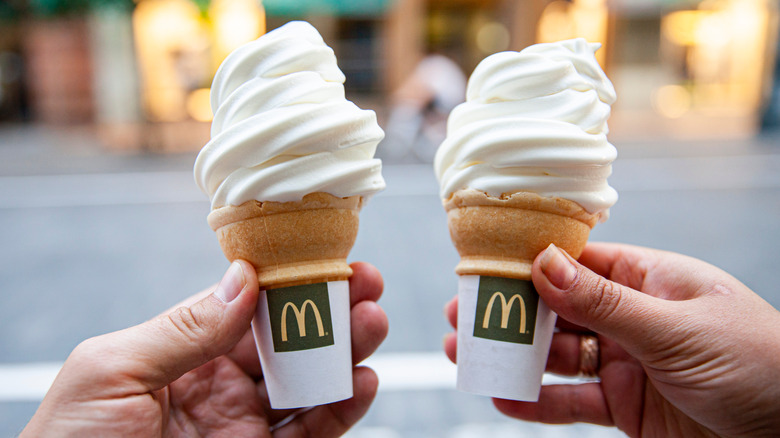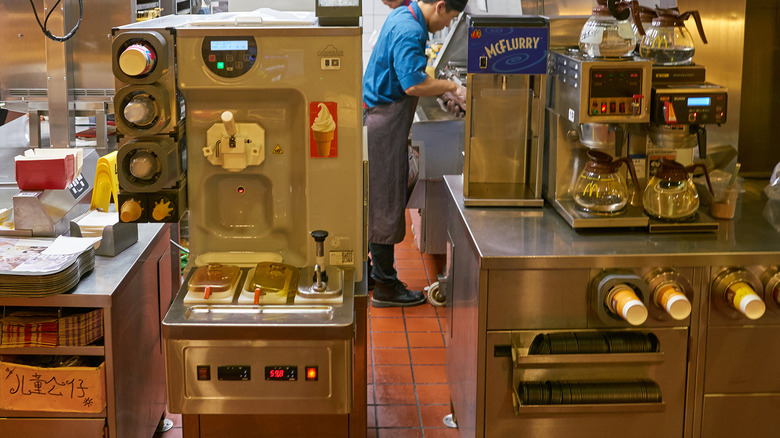Why McDonald's Broken Ice Cream Machines Are Getting Attention From The Feds
It's an all too common situation: You pull off the highway and into a McDonald's drive-thru lane ready for a McFlurry and maybe a side of fries when the voice on the other end of the microphone delivers the devastating news — "The soft-serve machine is broken."
At this point, it feels like nearly every person on the planet that's visited a McDonald's has experienced this moment. Frustrating? Yes. Illegal? Maybe.
You may have heard the rumor too that the ice cream machines usually aren't actually broken. Apparently, most of the time when the machine is "down," it's because the employees are cleaning it and are somewhere in the middle of a time- and labor-intensive 11-step process, or they just finished cleaning it and don't want to do so again. Or they maybe have even gotten a jumpstart on closing tasks and turned the machine off early. There are many suspicious possible reasons when it comes to the closure of the elusive soft-serve machines — and maybe they actually are broken — but it seems nobody can say with any real certainty where the truth lies.
And now, the federal authorities are looking into the problem, and they seem to be just as eager for answers as the rest of us. If you're wondering why law enforcement would get involved with something that seems, at worst, like an inconvenience and poor business planning, they actually have a pretty good reason.
The Federal Trade Commission wants to know as badly as you why the machines are always breaking
The Federal Trade Commission, or the FTC as it's usually abbreviated, is the governing body in charge of protecting consumer interest and ensuring fair market competition. According to the FTC's website, the basic statute the governing body enforces is that it "empowers the agency to investigate and prevent unfair methods of competition, and unfair or deceptive acts or practices affecting commerce."
With that in mind, they've got a few questions for Mickey D's. According to the Wall Street Journal, the FTC actually reached out to several McDonald's franchisees earlier this summer inquiring about the nearly constant broken machines happening across the country. Franchise owners told the FTC that the machines do break often and stated that they're overly complicated to fix. Getting the machines back up and running can take time because a technician has to come out and look at them, they furthered.
Essentially, the FTC wants to ensure the machines aren't purposefully difficult to fix. If you've ever heard the accusation that phones break right when a new update comes out, forcing consumers to buy a new one, this is a pretty similar situation. While the phone situation is more of a conspiracy theory, it illustrates the exact problem the FTC is tasked to stop: unfair commerce practices.
In a statement from McDonald's to USA Today, the company said, "Nothing is more important to us than delivering on our high standards for food quality and safety, which is why we work with fully vetted partners that can reliably provide safe solutions at scale. McDonald's has no reason to believe we are the focus of an FTC investigation." So, who is?
The machine's supplier may be the crux of this investigation
While McDonald's is involved in the investigation, they might not actually be the center of it. According to Insider, the probing is part of a bigger initiative by the Biden Administration to determine if manufacturers across a variety of industries obstruct businesses from fixing problems themselves.
The soft-serve machines are manufactured by a company called Taylor, but a few years ago, the article explains, "a company called Kytch created a diagnostic tool that would help McDonald's franchise owners fix their own ice cream machines." The tool was supposed to be able to be used widely across Micky D's franchises and decrease the time it takes to get the machines back up and running.
But, McDonald's said the tool was not sanctioned for use onsite. In response, Kytch filed a lawsuit against Taylor, claiming the manufacturer was "infringing on franchisees' rights to fix their own machine." All of this prompted the FTC's investigation.
While Taylor denied the claim, neither it nor Kytch has been contacted by the FTC yet. And though there isn't a clear answer yet, hopefully when the feds do close the case, we'll be one step closer to consistent soft-serve, sundae, and McFlurry access.


